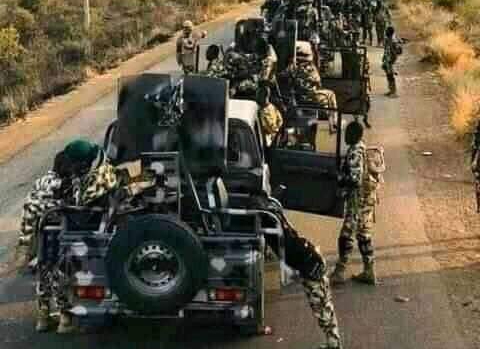“In times of war, the truth is so precious, it has to be protected by a bodyguard of lies” – Winston Churchill
The Nigerian military is battling Boko Haram insurgents in the Northeast and bandits in the Northwest. Our gallant soldiers are giving their lives so that ours can be saved. Yet, some enemies within are busy casting aspersions at the patriotic effort of the men and women at the frontline, who are braving hot and cold in deserts and dense forests and the prospect of certain death.
These arm-chair experts, reclining in their cozy comfort zones, are dispersing the campaign against terror in our country, through commentary that portrays Nigeria as a helpless weakling under the thumb of unassailable bandit commanders. As far as these detractors are concerned, there is nothing the military can do to win against their evil heroes.
Leaders at all levels and genuinely concerned citizens are supporting the fight on terror materially and morally as well as advancing constructive counsel on which way to go. But these cynical minds are engaged in their own campaign of diminishing our strength and hyping up the prowess of heartless thieves, murderers and hostage takers.
Now there are reports of triumphs by our combatants against the gunmen in the forests of Sokoto and Zamfara states. But even though these reports emanate from relevant authorities and corroborated by accounts of people on the scene, the doubting Thomasses maintain their dark narrative, ascribing this otherwise cheering news to what they prefer to call “propaganda”.
The haste of these self-styled commentators to criticize does however expose their ignorance on matters of security and defense. Unknown to them, propaganda is in fact part of the strategy of military campaigns, since the ancient and medieval times, up to this contemporary time. It has been a tool of inducing the public to hold a favorable opinion, so as to gain their support for the effort of the military.
Widespread aversion to a military campaign is a serious draw back that can weaken political will and lead to defeat. In military operations that have several fronts, like the current action against bandits in states of the Northwest and insurgents in the Northeast, reports of victories help to boost the confidence of the combatants in the trenches and those awaiting deployment to the front, while publicizing defeats will dampen the morale of the troops.
It’s therefore acceptable in the history of all states, including Muslim empires to project a positive impression of military campaigns and subdue their weaknesses and drawbacks. Knowledge of the latter is made exclusive to the strategists and commanders, for whom it’s operationally useful.
The media play a crucial role in this process. A proactive posture by news outlets is to pursue reportage that accords priority to successes against the enemy, while exercising self-cencorship on details of strategy, so as not to compromise the campaign. After all, the media industry exists solely for the public good.
It is in the interest of the public that the press are obligated to bond with the authorities at times like this, that the nation is facing clear present threats from a common enemy. And providing platforms for rabble-rousers and seekers of cheap popularity, at the expense of the nation’s survival, goes against every principle of the noble practice of the Third Estate of the Realm.
Shekara is a seasoned journalist and Special Adviser to Sokoto State Governor on Public Affairs



